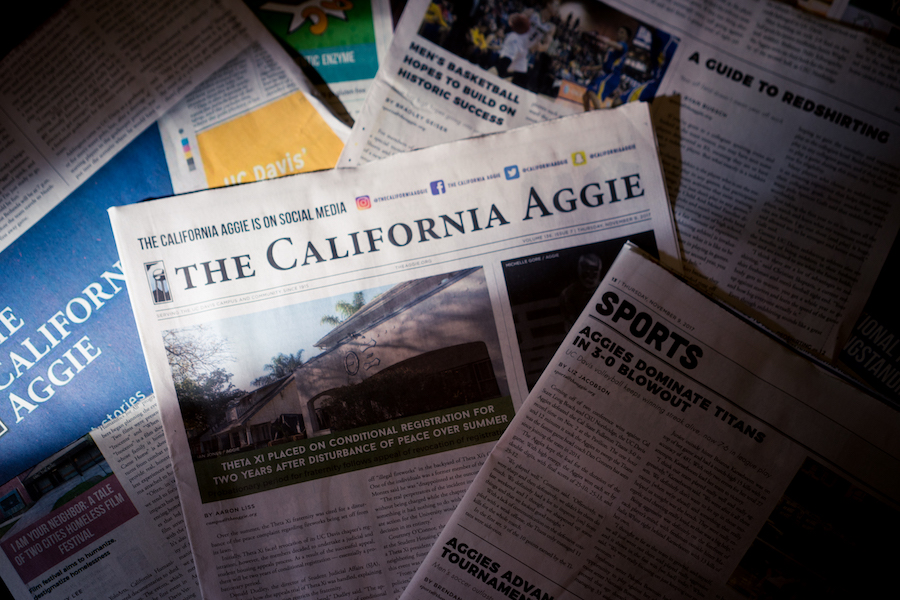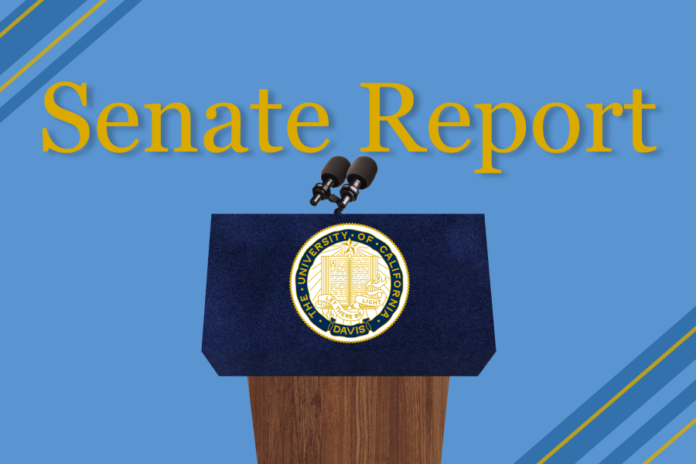Senators also heard quarterly, special reports and confirmed several commissioners
By VINCE BASADA — campus@theaggie.org
ASUCD Internal Vice President Aaminah Mohammad called the Nov. 14 senate meeting to order at 6:12 p.m. before reading the UC Davis Land Acknowledgement.
The table then heard a brief presentation on UC Davis’ Moving Forward Together plan, which is seeking input to improve travel infrastructure, safety and environmental impact on campus. Jeffrey Bruchez of Transportation Services and Robert Pattison of the Office of Campus Planning, informed the senate that $30 million will be allocated over the next 10 years for campus transportation improvements. In that time, research and student surveying will be done to support grant applications and prioritize ways to spend available grant money.
Housing Advising for Undergraduate Students (HAUS) Director Sam Hopwood, a fourth-year political science major, then gave his unit’s quarterly report. Hopwood said that the ASUCD Housing Fair, held on Nov. 13, had been successful with good turnout. He also reaffirmed HAUS’ commitment to bolster and advertise existing ASUCD housing resources, while also expressing hopes to expand the unit’s advocacy and services.
“If even one student is without a bed — that is something I cannot [accept] on my campus,” Hopwood said.
The senate then confirmed three members of the Disability Justice Committee: Adam Price, a third-year neurobiology, physiology and behavior major; Anisteicia Kinsey, a first-year biochemistry and molecular biology major, and Nhy Duong, a third-year nutrition science major. Duong was also confirmed as a commissioner to the Gender and Sexuality Committee (GASC), alongside Sophie Abrea, a first-year evolution, ecology and biodiversity major, and Caroline Wagner, a second-year political science major.
Later that meeting, the senate confirmed two members to the Sexual Assault Awareness Advocacy Commission: Emily Setiobudi, a third-year clinical nutrition major, and Sanjana Gudivada, a fourth-year psychology major.
The senate then heard five other quarterly reports. First was KDVS Radio’s report delivered by General Manager Fritzi Kornstaedt. Then, the Whole Earth Festival’s report was delivered by Co-Directors Jaye Duckhart, a fourth-year neurobiology, physiology and behavior major, and Katherine Krinsky, a fourth-year English major. The Environmental Policy and Planning Commission then gave their report presented by Chair Annie Kanjamala.
After a break, the senate heard from Picnic Day’s Unit Director Mina Sarmah, a fourth-year statistics major. Finally, Transfer Student Representative Safa Mohammad gave her office’s quarterly report.
Legislation
After ex-officio reports, the senate briefly discussed old legislation before moving onto new legislation. They swiftly passed the consent calendar, including SB#14, amending ASUCD bylaws to reduce the required number of applicant interviews and improve efficiency in the hiring process, and SB#16 which allocated $2,796.50 to GASC for the bulk purchase of Plan B for an upcoming event.
In discussing new legislation, the senate also unanimously passed SB#10, giving the Whole Earth Festival $6,500 to repair one of their solar light towers, and SB#17 to allocate $1,195.48 for a Raices Fuertes event to be held on Dec. 7, organized by Senator Luis Garcia.
The senate then discussed emergency legislation SB#18 to “redefine ASUCD Units and limit the jurisdiction of Executive Directives in alignment with UC Davis and [UC Office of the President, UCOP] policies.”
The bill also clarifies that ASUCD units are directly governed by the ASUCD Management Team through delegated authority from the Chancellor and that the policies of The California Aggie and KDVS are under the purview of Media Board, and not the ASUCD Executive Office and Management Team or the ASUCD Senate.
The bill was written by Senator Noblejot Singh at the behest of ASUCD President Gaius Ilupeju. Ilupeju said that conversations with his counterparts at UC Irvine and UC Riverside, whose student governments are “facing threats from admin” for going ahead with ethical spending and other initiatives, prompted him to clarify ASUCD policy.
“I want everyone to know that the stuff we have in our own bylaws aligns with university policy,” Ilupeju said. “That’s what this [bill] does. As far as things that are in our bylaws that might cause confusion that are pretty serious, I would say that this is at the top of the list. Financially speaking for us, this is the most important thing to clarify.”
Ilupeju did note that unlike some other student governments in the UC system, ASUCD shares a productive and good relationship with UC Davis administration and SB#18 passed unanimously.
Open forum
Moving to open forum, the senate, prompted by Ilupeju, discussed the need to ensure that STEM representation within ASUCD included majors aside from computer science.
“We love our engineers, we love our computer scientists,” economics major and External Affairs Commission (EAC) Chair Henry Rosenbach said. “And we’re here to support you. But we’re also here to support our agronomists, our psychologists. Everyone in STEM is very loved.”
Several senators then discussed The California Aggie’s coverage of their own quarterly report given to the senate the previous week.
Senator Dhilena Wickramasinghe expressed her belief that the article’s headline, “Senate hears quarterly reports and expresses concerns over student journalism at Nov. 7 meeting,” did not match the excerpt in the article on The Aggie’s quarterly report. She also expressed an issue with the lack of quotes from the interaction.
“A good bulk of the concerns that were brought up were concerning students’ privacy and education,” Wickramasinghe said. “I do find it extremely disingenuous that The Aggie would misconstrue what those conversations and concerns that were discussed were about. I generally don’t really care about what The Aggie has to say about us as senators, but I do hope that they would be courteous enough to recognize our concerns about their journalism when it’s in the print. Without the full story, without quotes that depict the back and forth, it is not a positive indication of their respect for students’ privacy.”
Senator Siddharth Jasthi also took issue with The Aggie’s stance on Constitutional Amendment #92, which enshrines students’ right to privacy in the ASUCD Constitution.
“The Editorial Board wants legislation passed that protects the privacy and security of all students on campus,” The Aggie’s editorial endorsement reads. “Especially given the University Office of The President’s new policies with regards to protesting, an amendment protecting student privacy is more important than ever. However, due to vague language in the proposed amendment, the Editorial Board does not offer Constitutional Amendment #92 a full endorsement. Instead, we recommend students read the full legislation and use their best judgment.”
Jasthi expressed his concerns with the Editorial Board’s reasoning.
“I think that The Aggie being opposed to a piece of legislation that in no way mentioned them and only talks about student privacy as it relates to ASUCD and the university is rather silly just because they think it is maybe targeting student journalism,” Jasthi said. “I don’t think that’s a fair assertion to make.”
“Framing [it] like, ‘it wasn’t complete because they didn’t have an enforcement mechanism,’ isn’t a good ascertation of [the amendment] when it’s not supposed to have one in the first place,” Jasthi said. “I would have hoped they would have recognized that it’s meant for a bill of rights and not a fully fledged bill.”
Senator Amrita Julka also expressed her dissatisfaction with The Aggie’s coverage.
“I mentioned a specific example that related to a student representative who brought up something related to her health and then this was fully disclosed in The Aggie,” Julka said. “I just want to reiterate how dangerous this piece of information was to include in The Aggie [and] how it was not related to her role in any capacity.”
“I would like to remind The Aggie that we are students before we are student government officials and so our personal privacy outside of our roles deserves to be respected as much as any other students,” Julka said. “I’d also just like to mention that when I did bring this up to The Aggie during their quarterly report, I felt like the answers that [Editor-in-Chief Chris Ponce] gave me were not adequate, and I felt like they truly did not care about the privacy of students coupled with the fact that they are not endorsing [Constitutional Amendment #92].”

“I really feel that The Aggie needs to include privacy into their [Code of Ethics] and that they need to really start valuing the humanity of these students and not just the fact that it’s something interesting to read in the papers,” Julka said.
The Aggie’s current Code of Ethics includes a passage on privacy which states “that private people have greater personal privacy than public officials. Only an overriding public need can justify digging into someone’s private life.”
Rosenbach also took issue with The Aggie’s usage of the names of public officials and students in articles.
“I think it’s most important to talk about sensitive issues being exposed in the press, especially in the times that are coming,” Rosenbach said. “We’re talking about health issues that might be coming with a nationwide ban and that could end up in criminal charges for certain people. Let’s remind you that these kinds of things are not only granted privacy by ASUCD bylaws or not only by a Code of Ethics, but sometimes the 14th Amendment. You have the right to privacy by federal law.”
“We understand that, as was mentioned by The Aggie, ‘In journalism names are everything,’” Rosenbach said. “But in here we’re all students. Our position is the same. So [writing] student A [or] student B is not going to change anything in a narrative because we all have the same title. We understand the idea of the names. But we also really ask The Aggie and plead that when putting those things into account, consider a broader scenario and not only what is going to break a headline or what is going to make people read, but the individual protection of a person and the effects that can have in a lifelong career.”
The Aggie, as per editorial guidelines, views names as essential to holding public and elected officials accountable so that their actions and quotes are clearly attributed to specific individuals. Anonymity is only granted to sources on rare and special cases, as mentioned in the Code of Ethics.
The meeting was adjourned at 10:28 p.m.
Written by: Vince Basada — campus@theaggie.org










